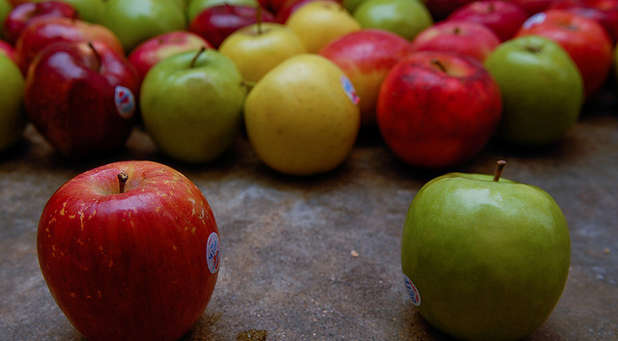The ‘Dirty Dozen’ List of Foods You Should Only Buy Organic
You should never buy apples that aren’t organic. For the fifth year in a row, apples topped the Environmental Working Group’s “Dirty Dozen” list as the fruit with the highest levels of pesticides.
Peaches, nectarines and grapes took second, third and fourth place. But the EWG found that two types of produce, green leafy greens and hot peppers, were so contaminated with pesticides that they deserved a category of their own, the “Dirty Dozen Plus.”
One of the main reasons people eat organic is to avoid pesticides, which are used liberally in growing many foods. A study published in February in Environmental Health Perspectives found that they are doing their bodies a favor. Researchers reported that people who ate organic fruits and vegetables had significantly lower amounts of organophosphates (OPs) in their bodies than those who ate conventionally grown produce.
OPs are components of many insecticides and herbicides, and they have been linked to numerous health problems. A 2010 study found a link between OPs and an increased risk of Alzheimer’s disease. Another study the same year found a dramatic increase in the risk of ADHD in children with high levels of OP residues in their urine.
Almost two-thirds of the produce samples tested by the U.S. Department of Agriculture contained pesticide residues, and the Environmental Working Group (EWG)’s “Dirty Dozen” list contains the most. With apples as the “dirtiest,” the rest of the list is as follows: peaches, nectarines, strawberries, grapes, celery, spinach, sweet bell peppers, cucumbers, cherry tomatoes, imported snap peas and potatoes.
The EWG considers the “Dirty Dozen Plus”—green leafy greens and hot peppers—particularly toxic to human health.
The “Clean 15” list, on the other hand, includes fruits and vegetables found to have the least amount of pesticides. Avocados topped the list, with only 1 percent showing pesticide residue. Other items on the clean list include sweet corn, pineapples, cabbage, sweet peas (frozen), onions, asparagus, mangoes, papayas, kiwi, eggplant, grapefruit, cantaloupe and cauliflower.
“Know which ones have the highest amounts of pesticides so you can opt for the organic versions, if available and affordable, or grab a snack off the ‘Clean Fifteen,'” said EWG senior analyst Sonya Lunder.
The EWG estimates that people can lower their pesticide exposure 90 percent by avoiding the most contaminated fruits and vegetables and eating the least contaminated instead.
“The bottom line is people do not want to eat pesticides with their fruits and vegetables,” said EWG’s president and co-founder Ken Cook. “That’s why we will continue to tell shoppers about agricultural chemicals that turn up on their produce, and we hope we will inform, and ultimately, empower them to eat cleaner.”
For the original article, visit newsmaxhealth.com.














































